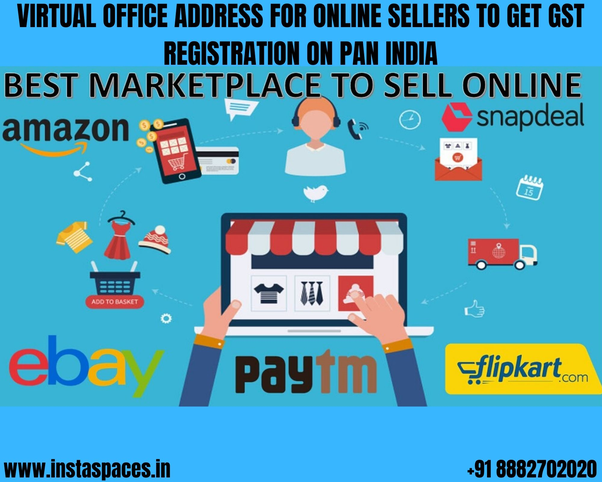The introduction of GST(Goods and Services Tax) has completely shifted the e-commerce business world in India in a way that nobody could have anticipated before. There is now no differentiation between goods and services. An excellent new level of competitiveness has been reached in the market because of the introduction of GST.

GST may also reduce the cost of collection of tax revenues which may lead to a financial gain for the government. The scheme could also spell wonderful news for the export of Indian products and services. The whole idea of using a single tax instead of multiple ones is something that people still struggle to get used to.
All of the taxes that were present before at the central and state levels have been subsumed. However, when one understands the complexities of the GST scheme, they will be able to help their businesses grow greatly.
Types of E-commerce Business
These are two types of e-commerce businesses and the rules of GST apply differently to both these kinds:
Direct sellers
This is the type in which the businesses directly sell products to their customers through their websites. In this case, the business should follow the normal GST rules. Amway, Avon Products and Herbalife Nutrition are examples of e-commerce businesses that are direct sellers.
E-commerce aggregator
An aggregator brings together buyers and sellers on a platform and gets a commission from each sale. Platforms like Flipkart and Amazon are examples of e-commerce aggregators. Unlike direct sellers, not all the sales made here are by the businesses themselves. Thus, they have to follow the GST regulations differently according to their situation. In order to do this, the concept of Tax Collected at Source(TCS) was introduced which can be seen more in detail under the impact of GST on e-commerce businesses in India.
Pros and Cons of GST
These are some pro and cons of GST has impacted the e-commerce sector in India:

Pros
- Elimination of cascading effect of taxes– This is known more simply as taxing a tax. Due to this, taxpayers had to pay higher amounts of tax than they did before. Now, it is a lot less since GST has done away with this feature.
- Contribution to Gross Domestic Product(GDP)- GST has done an incredible job at doing away with all of the indirect taxes and various divisions that existed in the market. A new unified national market has been formed due to GST which is great for promoting excellent economic growth for the country’s future.
- Doing away with corruption- Since GST services are handled completely online, the taxpayer can handle all of the work related to their taxes online without having to go through any tax authorities. This is a great way to reduce corruption and it will help more new businesses join the economy.
- Higher threshold– Businesses that have a turnover less than a certain amount do not have to register under the GST scheme. Many small businesses and service providers fall under this category.
- Composition scheme– Businesses will only have to pay taxes according to their minimum turnover. This is not applicable for e-commerce businesses for which it is compulsory to register under the GST scheme.
Cons
- Increased cost due to software purchase- Since GST registration is done completely online, special software has to be purchased in order to do it. The software that has to be bought may be expensive and extra resources also have to be spent instructing the employees on how to use the new software.
- Need to register in all states- Businesses will now have to register themselves in all the states that their business is active in which can be problematic or tedious. Problems like this can be done away with by purchasing a virtual office address which can be used by the business to register under the GST scheme in all the states that they need to. Money can be saved as the same virtual address can be used for all the states.
- Cost of hiring experts- Not all employees and business owners can be trained to pay their taxes under the GST scheme as it may be too complicated. Thus, separate experts will have to be hired to aid them in paying their taxes. This could lead to an increase in costs as well.
- Difficulties for smaller businesses- Before the introduction of the GST scheme, only businesses that had a turnover of over 1.5 crores would have to pay excise duty. That limit has now fallen to 25 lakhs(may change depending upon the state).
This means that many more small businesses will also have to pay GST. At the same time, these small businesses can apply for the composition scheme which can help them reduce the taxes that they have to pay. If they do this, they will not be able to claim any ITC. Thus, small businesses have to make a very difficult choice between paying higher taxes or availing the benefits of the composition scheme.
Ways in which GST has impacted the E-commerce sector in India
These are the various ways in which the introduction of GST has impacted the e-commerce sector in India:
Ease in paying taxes
Before, there were many more complications associated with paying taxes as there were so many different kinds of them that were present. Now, since all the taxes have been subsumed, it is much easier to pay taxes(GST). GST registration is completed completely online which is also very advantageous as e-commerce business owners will no longer have to run around between tax offices in order to complete their taxes. This new scheme saves time and also reduces stress.
Tax Collected at Source(TCS)
The seller will receive their payment from the e-commerce aggregator that they have collaborated with. Under the GST scheme, the business has to deduct 2% from the sale made and then send the remainder to the seller. This 2% has to be paid to the government as GST. The seller can then claim this amount as a deduction on the GST amount that they have to pay to the government. This may be good for the sellers but it is not for the e-commerce business. They have many more compliances under the GST scheme that they have to deal with which may be detrimental to their functioning.
Compulsory Registration
If a small business does not have a turnover that exceeds a particular amount, they do not have to pay GST. However, this rule does not apply to e-commerce business owners as it is compulsory for them to pay GST no matter what their turnover may be. If they do not register under the GST scheme, they will not be able to continue their business online and will have to leave the e-commerce space.
Ability to branch out sales
When GST had not been introduced yet, most businesses preferred selling their products in their own states so that they could avoid having to deal with the stress of VAT regulations in different states. When a company’s truck used to carry merchandise from one state to another, the company would have to file the required VAT declaration for that state and the registration number of the truck had to be mentioned as well.
Even if that does not sound too tedious, having to do that for each and every state(with different VAt regulations for each) was incredibly tedious and exhausting. Now, with GST, businesses can market their products to different states without worrying about those regulations as they are now gone.
This reduction in logistics cost is one of the biggest advantages afforded to e-commerce businesses registered under the GST scheme. This allows them to be able to branch out their sales effectively to different parts of the country with fewer worries than before.
Storing of goods
There is a very high cost associated with storing goods in warehouses. Even if the goods have not been sold, GST still has to be paid for them. This may lead to an overall increased cost for the e-commerce business.
Filing of tax returns
This is how taxes should now be filed under the new GST scheme. There will be a form called GSTR-1 which has a list of all the supplies that need to be submitted by the 10th of each month. The seller will receive tax details put together by the e-commerce business by the 11th of each month. After scrupulously reviewing these details, the seller has to send this form back by the 15th of the month. If there are any inconsistencies in the tax details, they have to be checked and resolved by the 20th of the month.
Inability to apply for compensation
Under the GST scheme, small businesses have found it hard to cope with compliance schemes. In order to make their lives easier, there is a compensation scheme under GST. Under this scheme, a business can pay their tax at a minimum rate according to what their turnover is. The threshold for businesses differs depending on what state they are in. This scheme is only available to suppliers of goods(service provides cannot avail this service). Unfortunately, e-commerce operators are not allowed to register under this scheme.
Availing Input Tax Credit(ITC)
This is an excellent advantage afforded to e-commerce businesses that can help them reduce the amount of tax that they have to pay. Consider a scenario in which a GST of Rs 50 has been paid by the business for the purchase of raw materials for their product. When these supplies are then converted to create a product which is sold, the customers are charged a GST of Rs 75 on their purchase.
Normally, this amount would have to be paid to the government as GST. However, using ITC, the Rs 50 spent on the raw materials can be deducted from this amount(Rs 75). Thus, the business would only have to pay Rs 25 to the government as GST. It can be seen how money can be saved by businesses using ITC.
Role of InstaSpaces
Understanding the importance of GST’s role in the marketplace is something that everyone should do. It will help them understand how it may cause a shift in the economy and affect their businesses. The members here at InstaSpaces are completely dedicated to doing our best to ensure that you are able to register your business under the GST scheme successfully.
You need not worry if your business is in many states as we can help you through the aid of a virtual office. GST registration may be a difficult process for those who have never done it before but you need not worry as we have an experienced team here to help you each and every step of the way. We will also help you get all of the documentation that you need for your GST registration.
In case you have any doubts at any point of time regarding GST, you can always approach us and we will help you in whatever way we can. We provide GST registrations across the entire country in all 28 states. As we move forward on this journey together, we request you to put your complete trust in us and not worry about what may happen. Since we have done this for many clients in the past, we are well-versed in whatever we are going to do. We are incredibly excited to go on this beautiful journey with you and help your e-commerce business get registered under the GST scheme.
Phone:- +91–888-270-2020
Email:- [email protected]
Happy Office Hunting!







